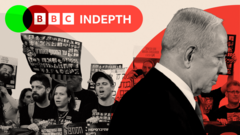Is Netanyahu Deepening Divisions in Israel?

Understanding the Complex Dynamics of the Israel-Hamas Conflict
The ongoing conflict between Israel and Hamas has not only shaped the political landscape of the region but also created deep societal divides within Israel itself. As Benjamin Netanyahu continues to assert Israel's unwavering resolve in the war, the reality on the ground tells a different story. There exists a growing rift between various factions of Israeli society, with voices calling for an end to the violence and those who support a more aggressive military approach. This article delves into the multifaceted perspectives surrounding the war, examining the implications for Israel and the Palestinian population in Gaza.
Netanyahu's Vision: A Fight for Survival
Since the onset of hostilities in October 2023, Netanyahu has positioned himself as a stalwart defender of Israel's right to exist. His rhetoric echoes historical figures like Winston Churchill, invoking a sense of duty to protect the homeland against perceived threats. The prime minister's insistence on a total victory over Hamas has resonated with a significant portion of the Israeli populace, who see the conflict as a moral imperative.
Netanyahu’s statements, laden with conviction, underline a narrative that frames the struggle as one between good and evil. This binary moral framing is intended to unify the nation under a common cause, yet it also obscures the complexities of the situation and the suffering experienced by civilians, both Israeli and Palestinian.
The Divisions Within Israeli Society
Despite Netanyahu's calls for unity, Israeli society is deeply polarized. The aftermath of the October attacks has not only left physical scars but has also exposed emotional and ideological rifts that have been festering for years. Protests against the government, particularly in Tel Aviv, highlight a growing dissent among those who oppose the current administration's handling of the war and its humanitarian implications.
Demonstrators holding placards inscribed with the names of Palestinian children killed in Gaza stand as a stark reminder of the civilian toll of the conflict. These silent protests, while gaining visibility, represent a minority viewpoint amidst a broader societal inclination to support military action, reflecting a complex blend of empathy, anger, and fear.
Public Sentiment and Humanitarian Concerns
Polling data illustrates a significant dissonance in attitudes towards the humanitarian crisis in Gaza. A large majority of Jewish Israelis do not express concern over Palestinian suffering, with many believing that Israel is making substantial efforts to mitigate harm during military operations. In stark contrast, the Palestinian Arab minority in Israel exhibits a heightened sensitivity to the humanitarian crises unfolding in Gaza, revealing a glaring divide in perspectives.
Netanyahu's government has consistently dismissed reports of humanitarian crises as fabrications, framing the narrative around the conflict through a lens of historical persecution. This rhetoric serves to bolster national solidarity but simultaneously alienates those who advocate for a more compassionate approach to the situation.
The Role of Media and Public Perception
The portrayal of the conflict in Israeli media plays a critical role in shaping public perceptions. Many journalists have faced backlash for highlighting the suffering of Palestinians, with some arguing that the mainstream media often neglects to show the human side of the conflict. This selective coverage contributes to a skewed understanding of the war, leaving many Israelis unaware or indifferent to the plight of civilians in Gaza.
Discussions on popular television programs often sidestep the complexities of the humanitarian crisis, focusing instead on the narratives of hostages and military success. This lack of representation further entrenches divisions within Israeli society, as differing viewpoints often clash in public forums.
Hostage Crisis: A Central Concern
The fate of Israeli hostages remains a pressing concern for many citizens. The psychological toll of the hostage crisis is palpable, influencing public sentiment and placing immense pressure on the government. Many Israelis view the war through the lens of the hostages' safety, prioritizing their return over broader humanitarian considerations.
This fixation on hostages complicates the discourse surrounding the conflict, as calls for a ceasefire are often interpreted as capitulation to Hamas. The fear of losing more lives, both Israeli and Palestinian, adds another layer of complexity to an already intricate situation.
Religious Zeal and Political Ambitions
The current conflict has also emboldened certain religious factions within Israeli society, who view the war as an opportunity to further their ideological goals. Figures like Bezalel Smotrich advocate for a more hardline approach towards Gaza, espousing views that align with religious nationalism and a desire for territorial expansion.
This religious fervor intersects with political ambition, as ultra-nationalist parties leverage the conflict to consolidate power and promote their agendas. The implications of this shift could have long-lasting effects on both Israeli policy and the broader peace process.
The Quest for Peace: A Distant Dream?
As the conflict drags on, the prospect of a peaceful resolution seems increasingly elusive. Calls for a two-state solution have been overshadowed by the current administration's reluctance to engage in meaningful dialogue with Palestinian leadership. The ongoing violence further entrenches positions on both sides, making reconciliation appear more distant than ever.
Many Israelis are left grappling with the question of what the future holds. The divide between those who support continued military action and those advocating for peace remains stark, reflecting a broader struggle for identity and purpose in the midst of chaos.
Understanding the Psychological Impact
The psychological impact of the conflict is profound. Israelis are facing a collective trauma, exacerbated by the ongoing violence and the threat of further escalation. The emotional toll is evident, as many citizens cope with fear, anxiety, and uncertainty regarding their safety and the future of their country.
Efforts to address this trauma must be coupled with a commitment to understanding the human cost of the conflict. Only through acknowledging the pain of both Israelis and Palestinians can a path forward be envisioned.
Conclusion: A Call for Reflection and Action
The ongoing conflict between Israel and Hamas raises critical questions about morality, justice, and the future of peace in the region. As divisions deepen and the humanitarian crisis escalates, it is imperative for both Israeli and Palestinian voices to be heard. Acknowledging the complexities of the situation and embracing dialogue may pave the way for a more hopeful future.
What steps can be taken to promote understanding and healing in the aftermath of such profound conflict? The journey toward peace requires courage and empathy from all sides. In a world filled with division, can we find common ground to foster reconciliation? #Israel #Palestine #Peace
FAQs
What are the main causes of the Israel-Hamas conflict?
The Israel-Hamas conflict is rooted in historical grievances, territorial disputes, and differing national identities. Key issues include the status of Jerusalem, borders, and the rights of Palestinian refugees.
How has public opinion in Israel shifted since the conflict began?
Public opinion in Israel is polarized, with many citizens supporting military action against Hamas while others call for an end to hostilities and a focus on humanitarian concerns.
What role does religion play in the conflict?
Religion plays a significant role in the conflict, influencing the beliefs and motivations of various factions within Israeli society. Religious nationalism has gained prominence, shaping political agendas and attitudes towards Palestinians.
```Published: 2025-08-14 23:42:05 | Category: technology



